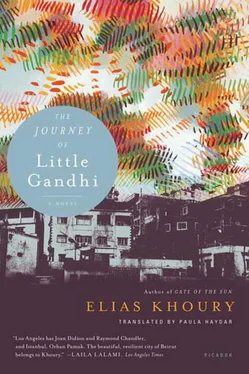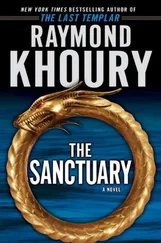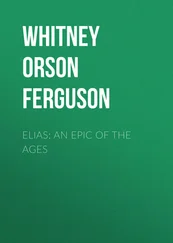He said to Madame Lillian that her eyes were the mirror of the world, and didn’t ask her to fly. But she was a crazy woman, what can you ask of a crazy woman?
The Reverend Amin didn’t know how he asked her to fly. He saw his voice coming out of him, thick and melodious, as if it weren’t his voice.
“Fly. Fly.”
And he started waving his hands like a fan.
He was engulfed with a strong desire to see her jump. When he stood her in front of the window after turning out the light, he stood behind her and started flapping like a fan. He opened the window and tried to push her, to make her fly. The woman got scared and threw herself onto the floor and started crying.
“Everything is a mirror,” Amin said to Gandhi, watching him bent over his shoes, as if he wanted to swallow the world.
“And God is a mirror, God is a mirror but man refuses to see his face. God is his face, but man is afraid.”
Madame Lillian got scared and started to cry. Gandhi told Fawziyya when he married her that he didn’t like this profession. He liked to see shoes shimmering in the light, but he didn’t like the profession, he’d rather leave it. When the dog came into the picture, he did leave it and opened his own restaurant.
Fawziyya wouldn’t say anything, she’d agree without saying anything. She’d give birth to the babies and the babies would die. Husn came, and lived, and after him Suad, and then Fawziyya went back to death; the baby would be born dead or die shortly after birth.
Gandhi was dizzy with sadness. He took her to see every doctor at the American University, the ones he knew and the ones he didn’t know. They gave her medicine and vitamins. He spent all his money on medicine. During his last visit to Dr. Naseeb Suleiman, the doctor advised Gandhi to stop the pregnancies. Fawziyya was sitting there with her head down while the doctor talked to Gandhi, telling him it wasn’t good, that the woman could die. You have to stop the pregnancies.
Gandhi shook his head in agreement and told the doctor the best thing would be a divorce, because he’d tried everything he knew, but Fawziyya kept getting pregnant, he’d come near her and she’d get pregnant, and he couldn’t take it anymore.
“Buy a kabbout,” 9the doctor said.
“What for?” asked Gandhi.
“Buy a kabbout and sleep with her, and … you know.”
“Of course I know,” said Gandhi.
They went out of the doctor’s office. Fawziyya went home, and Gandhi went to Souq Sursuq and bought a heavy wool coat. He went home and slept with Fawziyya.
When Gandhi told the story of the coat, he’d have tears in his eyes and he’d laugh. He’d put his hands over his eyes and shake his head, as if he wanted to stop himself from laughing.
“I was stupid. The coat taught me to be sly, and if I weren’t sly, how do you think I could survive? What kind of life is this, sitting and waiting around? Those who wait around will get nowhere, nowhere but the grave. But life is different. As I was saying, dear sir, I bought the wool coat and went home and slept with the woman with the coat on top of us. We were dripping with sweat. I was going to choke, and she was about to die. She’d be under me, saying over and over ‘Oh God, Oh God, Oh God’ and I’d be saying it along with her, and the sweat came down like rain. I said, it’s okay, it’s better than the woman dying. Then I find out she’s pregnant. I paid six liras for that coat. Do you know how much six liras is? Like two thousand today, tomorrow it’ll be worth a hundred thousand. What did I know. I paid and we drowned in sweat and she still got pregnant, and I went crazy.”
“I went to see Dr. Naseeb and I told him. He laughed so hard his eyes watered, and kept laughing till he almost died. He was rolling on the floor with laughter, so I started laughing. If the doctor laughs, the patient should laugh, too, right? But I wasn’t a patient.”
Dr. Naseeb was ready to hear anything but that story. He went out of the clinic and called the rest of the doctors. They all laughed and Gandhi laughed with them. Then he felt like he was surrounded, like a cat surrounded by a bunch of mischievous children. He closed his eyes and started gasping for air. Dr. Naseeb noticed, and so he changed the subject. He started speaking in English. After everyone left and only Gandhi was left, the doctor said, “You go to the pharmacy, Heliopolis Pharmacy, and buy a kabbout from there.”
He explained to him the virtues of the condom.
“That day I understood,” Gandhi said. “Life is like the condom: you either use it, or become one yourself and others use you. I used to be one, but not anymore, now I’m sly. I went to the drugstore and bought six condoms for twenty-five piasters. But she wouldn’t do it at first, then she went along, women go along with things, and she said it’s in God’s hands, and we left it in God’s hands.”
When Little Gandhi married his cousin Fawziyya, he knew nothing but trusting things to God. The story of his escape couldn’t have happened without this faith in God. Everyone said the boy was dead. In Mashta Hasan they said the beast had killed him, but Husn, his father, knew he wasn’t dead. He told his wives and daughters the boy wasn’t dead. He called them together around his bed during his final moments alive and told them the boy wasn’t dead. He said he saw him once in Beirut, and that Abd al-Karim gave him five liras to take a taxi back to the village, and that he wanted his son, that he didn’t want to die. He started screaming that he didn’t want to die, while Sheikh Zakariyya stood over his head, prompting him as he refused to repeat the words, then his lower jaw began to tremble, his voice faded, and Sheikh Zakariyya was saying, “Husn, son of Najibi, if the two angels have come to you, tell them God is my Lord, Muhammad is my patron, Islam is my religion until resurrection day.” And Husn, the son of Abd al-Karim al-Ahmadi al-Mughayiri staggered under Sheikh Zakariyya’s words, dying.
After the burial, Abd al-Karim came back to the village once, to get married. He married Fawziyya, the daughter of his uncle the lupine vendor. They sat him down, and they sat her down, he was wearing his new black suit, she was wearing a white gown, and people surrounded them, clapping. His father’s second wife was squeezing lemons, preparing the lemonade and serving it. Fawziyya was sitting on the round stone, and he sat facing her waiting for Sheikh Zakariyya. The sheikh arrived, so everyone clapped and the singing and dancing began. Then the sheikh raised his hand and said to the bride, he asked her and she said,
“I am sitting on the stone, hear O divine Lord, I love this man, according to the law of God and His Messenger.”
He asked her to repeat, and so she repeated the sentence three times. Sheikh Zakariyya approached her and placed a handful of wheat in her hand.
He turned to Abd al-Karim, and the little man said, “I am sitting on the ground, hear O Lord of Lords, I love this woman, according to the law of God and His Messenger.”
He asked him to repeat, and so he repeated the sentence three times. Then he asked Fawziyya to stand, and so she stood, and sprinkled the wheat over Abd al-Karim’s head and let out a single shrill.
Gandhi took her and they got in a taxi and went back to Beirut. He didn’t bathe, as was the custom, and he didn’t take her to his father’s house, where the people would wait to see the white sheet stained with blood. He was like a stranger in his village. He accepted going through the ceremony on the stone because the lupine vendor insisted on it. They wrote the marriage contract in Beirut, and Gandhi wanted to marry her without going back to the village, but the lupine vendor insisted.
“A marriage has to have a stone, my son. When a person dies, he puts his head on a stone, and when he gets married, the woman sits on a stone, it can’t be otherwise, you can’t have a marriage without a stone.”
Читать дальше












